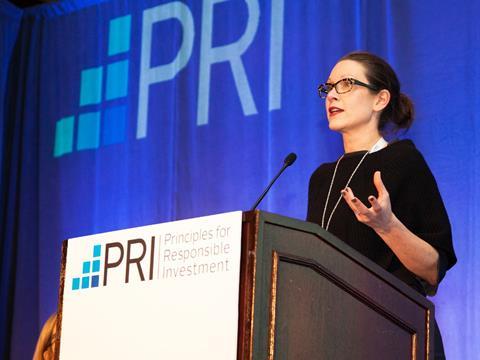Sustainalytics Prize for Excellence in Responsible Investment Research: STUDENT PRIZE (JOINT WINNER)
Sarah Barker, University of Melbourne
Key findings
- Climate change presents material financial risks.
- The duty of care and diligence requires directors to be informed and engaged; ignorance and inaction are no defense.
- Directors may be liable for damage resulting from corporate inaction on climate change.
- Active governance of climate change risks and opportunities is increasingly required to satisfy directors’ duties
This paper examines corporate directors’ duties in the context of climate change as a material financial risk. The author builds the case that directors are increasingly at risk of being held liable if they do not actively govern the corporation around the material impacts of climate change. Barker addresses the question, does ‘business as usual’ on climate change governance satisfy directors’ (trustees’) fiduciary duty of due care and diligence? within Australian law.

Climate change
Anthropogenic climate change refers to changes in the composition of Earth’s atmosphere resulting directly or indirectly from human activity. Impacts of climate change are evident today with droughts, floods and other natural disasters causing human suffering and physical destruction. In response, the scientific and economic communities are asking that companies implement mitigation strategies to reduce the level of greenhouse gas (GHG) emissions, known to be the primary cause of climate change. In addition, if companies do not adapt to the observed, committed and potential impacts of climate change, they may be susceptible to significant financial impacts which may affect its relative competitiveness, if not viability.
The discipline of ‘climate change law’ is relatively new and, to date, has primarily focused on responsibility for emissions and costs of mitigation. The law on liability for the damage caused by climate change impacts is in its infancy, and there is even less law and scholarship on the specific question of directors’ and trustees’ liability for failures in the governance of climate risks.
Directors’ duties
The board of directors is responsible for overseeing the performance of the corporation as well as monitoring and supervising its regulatory compliance. Directors are governed by fiduciary, common law and statutory requirements with the underlying themes of loyalty (good faith, acting in the best interests of the firm) and competence (care and diligence).
The pursuit of financial interests requires the board to oversee risk and strategy, which directors are required to perform with due care and diligence. Barker cites interpretations of the standard of conduct required to discharge the ‘duty of care and diligence’ as a ‘reasonable director in the circumstances’ or as ‘a prudent superannuation trustee (i.e., professional trustee) would exercise…’ As courts are hesitant to second-guess corporate commercial business decisions, Australia instituted the ‘Business Judgment Rule’ to provide a ‘safe harbor’ against personal liability when decisions are honest, informed and rational. However, incompetence is not a defense.
The standard of the ‘reasonable director’ is increasingly being raised due to the growing complexity of business and markets. Directors are expected to become informed and understand the business of the corporation, and the economic context in which it operates, in order to oversee corporate risk management and strategy with due care and diligence. Risk management and strategy are linked to value creation of the firm, instrumental in company culture and fostering an environment for growth and innovation.
The science of anthropogenic climate change poses unprecedented ecological risks as well as new opportunities for well-positioned companies. Seen in this context, environmental risks are a material determinant of corporate wealth creation, and squarely within the purview of corporate ‘best interests’ and directors’ duty of care and diligence.
Nevertheless, directors are generally not proactive on climate change issues. The author outlines several reasons for governance inaction around climate change - reasons that are increasingly inadequate to satisfy directors’ (and trustees’) duty of due care and diligence:
- denial – a climate denier or sceptic;
- honest ignorance – oblivious to the risks of climate change;
- uncertainty paralysis – uncertainty in the speed, scope and scale of climate change impacts;
- conscious cost/benefit – intentional, rational, informed decision to maintain ‘business as usual’;
- standards-based - default to regulatory requirements or industry standards/norms.
Conclusion
Barker concludes that, increasingly, an inactive, passive or reactive corporate governance approach to climate change may be inadequate to satisfy directors’ duty of care and diligence. Courts are clear that directors are expected to be proactive and engaged when carrying out their statutory duties.
There are several implications on governance and how climate change is viewed within corporate social responsibility (CSR): Active governance of climate change as a material financial risk is increasingly required to satisfy directors’ duties. Fund trustees may be expected to have standards of prudence and diligence at least as high as corporate directors. Moreover, procedural diligence by directors, rather than the substantive outcomes of their judgments, is the focus of regulators and the courts in applying the duty of care. Climate change should no longer be framed as an ‘E’ (environment) within ‘ESG’. At a minimum, it should be considered as a ‘G’ (governance) issue.
At its extension, the evolution of climate change into a material financial risk may mean that orthodox theories of CSR, which posit climate change as a non-financial environmental externality, are now redundant in their application to this issue.
Download the issue
-

RI Quarterly Vol. 5: Highlights from the PRI Academic Network Conference 2014
November 2014
RI Quarterly Vol. 5: Highlights from the PRI Academic Network Conference 2014
- 1
- 2
- 3
- 4
- 5
 Currently reading
Currently readingDirectors' duties in the anthropocene: liability for corporate harm due to incation on climate change
- 6
- 7
















